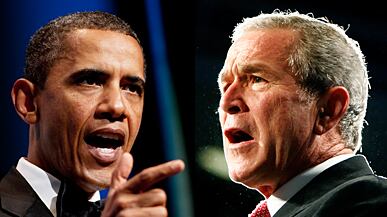The president’s efforts to assassinate the American-Muslim cleric al-Awlaki are the latest sign that he’s embraced Bush’s radical views of executive power, says Roger D. Hodge. His new book, The Mendacity of Hope, argues that Obama has betrayed liberalism and the Constitution.
For many of Barack Obama’s supporters in 2008, the simple fact that he was not a member of George W. Bush’s party of permanent war was sufficient to secure their votes. Obviously there were many other reasons for supporting Obama, but for a large number of Americans the prospect of ending the war in Iraq, closing Guantánamo, rolling back the Bushite assault on civil liberties, and banishing torture was enough. More than enough. Plenty of evidence was available that the ambitious freshman senator had no intention of making good on his promises to clean up our national culture of corruption, but few suspected that our new president would thoroughly and wholeheartedly embrace his predecessor’s approach to the global war on terror. Over the last two years, however, Obama has done just that.
Last Friday, the Obama Administration chose to strike a terrible new blow against American civil liberties and the rule of law. In keeping with longstanding tradition, that blow was struck in the name of national security.
The story has been developing all year, since the Obama Administration leaked word in January that an American citizen named Anwar al-Awlaki had been targeted by the U.S. military for extrajudicial assassination. Unnamed sources explained to reporters that this formerly moderate Muslim cleric was now a dangerous terrorist, a dire threat to national security. In April, the administration let it be known that Awlaki had been added to a CIA kill list, and it was suggested that he was the first American to be so honored. Representative Jane Harman even declared that Awlaki is “probably the person, the terrorist, who would be terrorist No. 1 in terms of threat against us.”
A bigger threat than Osama bin Laden? How could this be? What crimes had the man committed? Here things begin to get murky. We have been assured that he provides inspiration to terrorists; that he was in contact with Umar Farouk Abdulmutallab, the hapless underwear bomber; that his belligerent writings and sermons inspired Faisal Shahzad, the man accused of trying to bomb Times Square; and that he has been linked to Nidal Malik Hasan, the army psychologist charged with killing thirteen people at Fort Hood. Quite a litany of outrage, but to date no hard evidence of criminal conspiracy has been produced. Our leading newspapers have run long articles detailing the enormity of this preacher’s hatred for the United States, but these organs of official viewpoints betray few hints that the Obama administration might itself be committing a war crime by targeting Awlaki for assassination.

In December, Awlaki narrowly escaped a Predator drone attack that reportedly killed 41 civilians, mostly women and children.
The government claims that Awlaki has assumed an “operational role” in Al Qaeda on the Arabian Peninsula, but anyone familiar with the long list of U.S. intelligence blunders—the shameful record of innocent individuals kidnapped, rendered, and tortured only to be set free with an apology or left to rot in Guantánamo—can only respond with skepticism to such assertions. Because Awlaki is an American citizen, who was born in New Mexico, officials have said that special approval for the assassination order had to come from the National Security Council. How comforting to devotees of due process. Even so, despite the fact that the Obama Administration for its own obscure reasons has quite deliberately informed the entire world that Awlaki graces both a JSOC and a CIA kill list, the government has declined to file charges against him and it has produced no evidence of his operational activities.
“There would be nothing stopping the government from targeting someone in Texas except political and policy considerations.”

In July, the Secretary of the Treasury declared Awlaki to be a “specially designated global terrorist,” thus making it a crime for lawyers to represent him without obtaining a special license from the suitably Orwellian-named Office of Foreign Asset Control. After obtaining the necessary license, the ACLU and the Center for Constitutional Rights joined Awlaki’s father in a lawsuit challenging the government’s death sentence. On Friday, the Department of Justice responded. After running through a number of arguments seeking, incredibly, to deny standing to a father contemplating the extrajudicial execution of his son, the government argued that a court of law can have no role in determining whether President Obama may authorize the assassination of an American citizen, though it coyly refused to confirm or deny that Awlaki has been targeted. Brushing aside demands from the plaintiffs to provide evidence that Awlaki’s continued existence constitutes an imminent threat, the operative legal standard for lethal force, the brief asserted that simply allowing the case to proceed would reveal state secrets and jeopardize national security. After eight years of executive lawlessness, after the fraudulent justification of the Iraq War, the spectacle of Abu Graib, and the horrors of CIA torture sites, President Obama has the audacity to ask us to trust him on this one.
I asked Vincent Warren, executive director of the Center for Constitutional Rights, what the ramifications would be if the government succeeds in suppressing judicial review in this case. “By not intervening to at least review the matter,” Warren told me, “it would reinforce the view that the courts have no role in determining how the president chooses to combat terrorism, whether internationally or on American soil.” That outcome, he went on, “would entrench the tendency, which has continued from the Bush Administration into the Obama Administration, to say that some laws simply don’t apply to the executive when it chooses to invoke national security.”
Indeed, the radicalism of the executive prerogative asserted in this case is breathtaking, yet such is the state of American justice. According to our laws, the search of an American’s home requires a search warrant issued by a judge, but our present chief magistrate claims the power to execute summarily a citizen who has not been shown to be directly engaged in violent activity or combat. Apparently, this is what Obama means by pragmatism: that laws may be suspended at will in the name of convenience. We shall simply murder our ideological adversaries and then brag about it in the press, blithely assuming that such crimes will silence the chorus of enemies. What all-important tactical aim will the extrajudicial murder of this disloyal American citizen achieve? His sermons are already widely available; his incitements would live on after him, endowed with a made-in-America aura of martyrdom. If anything, Awlaki’s assassination would constitute a proof of his argument.
Aside from this particular case, I wondered whether anything, in principle, would prevent the targeting of someone who was located in, say, West Texas rather than Yemen. I also put that question to Warren. “No, I don’t think so,” he told me. “There would be nothing stopping the government from targeting someone in Texas except political and policy considerations.” Of course the government would claim that all kinds of circumstantial and factual differences would obtain. “But the circumstances around the two areas shouldn’t be the defining principle,” Warren said. “It’s either that they’re allowed to do it or they’re not allowed to do it.”
Constitutional principles, unfortunately, are all too perishable during wartime, and the war on terror threatens to last forever.
So let us pause and recollect the facts before us. The government of President Barack Obama, who was swept into power promising to set the world aright, has arbitrarily asserted the absolute authority of the executive to condemn an American citizen to death in absentia, without due process and in transparent violation of the Constitution and international law, and it has invoked the state secrets privilege to shield that decision from judicial review. It is as if Thomas Jefferson, after defeating the Federalists in 1800, had taken office and immediately applied the hated provisions of the Sedition Act to his political enemies. As James Madison wrote in The Federalist, “The accumulation of all powers legislative, executive and judiciary, in the same hands, whether of one, a few or many, and whether hereditary, self-appointed or elective, may justly be pronounced the very definition of tyranny.”
Plus: Check out Book Beast for more news on hot titles and authors and excerpts from the latest books.
Roger D. Hodge is the author of The Mendacity of Hope: Barack Obama and the Betrayal of American Liberalism. Hodge was the editor-in-chief of Harper's Magazine from 2006 to 2010. He joined the staff of Harper's in 1996, created the magazine's "Findings" column, as well as the online "Weekly Review," and was a National Magazine Award finalist for Reviews and Criticism in 2006. He lives in Brooklyn, New York, with his wife and their two sons.






